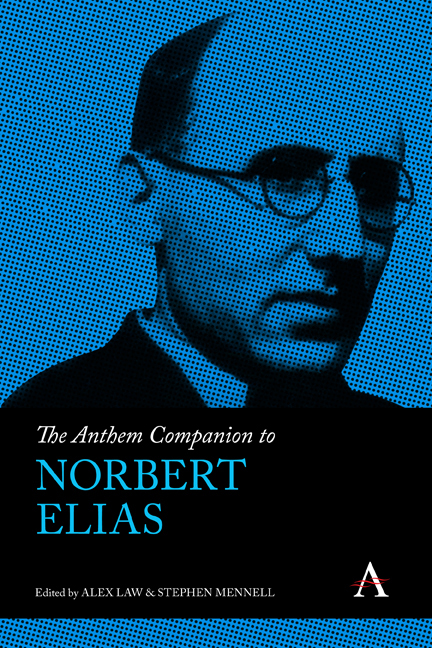Book contents
- Frontmatter
- Contents
- Notes On Contributors
- Acknowledgments
- Introduction: The Sociological Promise of Norbert Elias
- One Norbert Elias: Genesis of a Determined Thinker
- Two Knowledge, Science and Method: The Sociological Practice of Norbert Elias
- Three Norbert Elias’s Comparative Historical Sociology: Against Process Reduction
- Four Power and Process: Norbert Elias and the Paradox of Inequalities
- Five Norbert Elias and Shifting Gender Relations
- Six Travelling With Elias: Figurations and the Racialising Process in South Africa
- Seven Excitement Processes, Embodiment and Power Relations in Sport and Leisure
- Eight Warfare, Survival Units, National Habitus and Nationalism: Norbert Elias’s Contribution to Political Sociology
- Nine Elias’s Contribution to International Relations Theory: Towards a Global Sociology
- Ten Crime, Government and Civilisation: Rethinking Elias in Criminology
- Eleven Art and the Civilising Process
- Twelve From Social Mobility to Channels of Opportunity: Norbert Elias and Education
- Appendix: Published Works of Norbert Elias in English
- Index
Two - Knowledge, Science and Method: The Sociological Practice of Norbert Elias
Published online by Cambridge University Press: 28 February 2024
- Frontmatter
- Contents
- Notes On Contributors
- Acknowledgments
- Introduction: The Sociological Promise of Norbert Elias
- One Norbert Elias: Genesis of a Determined Thinker
- Two Knowledge, Science and Method: The Sociological Practice of Norbert Elias
- Three Norbert Elias’s Comparative Historical Sociology: Against Process Reduction
- Four Power and Process: Norbert Elias and the Paradox of Inequalities
- Five Norbert Elias and Shifting Gender Relations
- Six Travelling With Elias: Figurations and the Racialising Process in South Africa
- Seven Excitement Processes, Embodiment and Power Relations in Sport and Leisure
- Eight Warfare, Survival Units, National Habitus and Nationalism: Norbert Elias’s Contribution to Political Sociology
- Nine Elias’s Contribution to International Relations Theory: Towards a Global Sociology
- Ten Crime, Government and Civilisation: Rethinking Elias in Criminology
- Eleven Art and the Civilising Process
- Twelve From Social Mobility to Channels of Opportunity: Norbert Elias and Education
- Appendix: Published Works of Norbert Elias in English
- Index
Summary
Introduction
Although Norbert Elias's On the Process of Civilisation is by far his most widely known work, his sociological theory of knowledge and the sciences deserves to be regarded as of at least equal significance for sociology and cognate disciplines. Indeed, it has even been argued (Mennell 2022, 24) that On the Process of Civilisation should be seen merely as an early empirical case study illustrating Elias's vision of how sociological knowledge can be pursued.
One reason why Elias's sociology of knowledge is less well-known is that it was developed gradually in tandem with painstaking empirical work, and across an array of books and essays. Its beginnings can be glimpsed in his earliest writings in the 1920s and 1930s (Elias 2006), but its first fuller expression came after he had worked on the empirical–theoretical studies presented in On the Process of Civilisation and The Court Society. This first formal working out came in 1956, in an article in the British Journal of Sociolog y entitled ‘Problems of involvement and detachment’, a title that led to its being commonly misunderstood as yet another essay on ‘objectivity’ in the manner of Max Weber, rather than as an outline of what became a fully-fledged sociological theory of knowledge. The theory was further developed in numerous essays in the last two decades of Elias's life, the 1970s and 1980s.
Where to Find Elias's Theory of Knowledge
Given that these writings are so scattered, it is as well to say where the main components can be found. The original 1956 essay is included in the book Involvement and Detachment (Elias 2007a [1987]), along with an equally important essay entitled ‘The fishermen in the maelstrom’, two fragments ‘On the great evolution’, and a substantial Introduction by Elias. A dozen late essays that appeared in many different books and journals are collected for the first time in Essays on the Sociolog y of Knowledge and the Sciences (Elias 2009a). But besides these, there are two important late books that are highly relevant: An Essay on Time (Elias 2007b [1992], and The Symbol Theory (Elias 2011 [1991]). Finally, Elias left behind a mass of usually unfinished papers, some of which have been published since his death by permission of the Norbert Elias Foundation and the Deutsches Literaturarchiv, Marbach am Neckar. Two are particularly relevant to the concerns of this chapter.
- Type
- Chapter
- Information
- The Anthem Companion to Norbert Elias , pp. 31 - 54Publisher: Anthem PressPrint publication year: 2023



